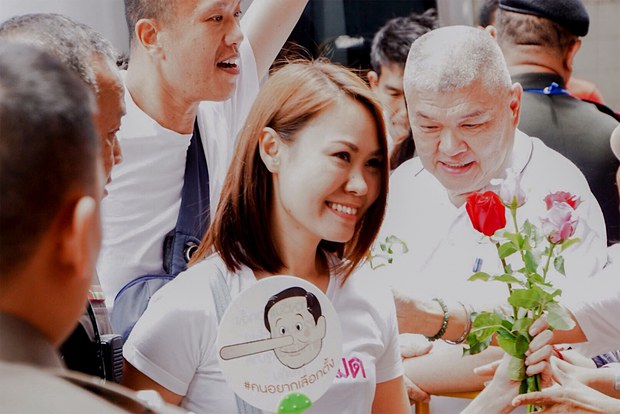Thailand: Anti-junta Protesters Charged with Sedition Released On Bail
2018.05.24
Bangkok
 Protest leader Nuttaa Mahahtana (center), receives roses from supporters before entering a Bangkok court room, May 24, 2018.
Protest leader Nuttaa Mahahtana (center), receives roses from supporters before entering a Bangkok court room, May 24, 2018.
Thai authorities on Thursday released on bail 15 pro-democracy demonstrators who led a march in Bangkok this week to protest the fourth anniversary of a coup that brought the military to power.
Authorities charged protest leader Rangsiman Rome and the others with five charges including sedition for leading a rally of about 300 protesters, who began at Thammasat University but were blocked by police from reaching the prime minister’s office.
“We rallied in line with our constitutional rights. We did not do anything wrong,” Rangsiman told BenarNews after being released on bail following his appearance in a Bangkok court. “Until the election is set, we will continue to protest.”
The activists were each released on a bail of 100,000 baht (U.S. $3,175), but on condition that they not repeat the crimes, according to lawyer Krisadang Nutcharas. Along with sedition, which carries a maximum seven-year prison sentence, they were charged with violating the junta’s ban on political gatherings of more than five people, and three other charges.
A Thai deputy prime minister defended the prosecution even though it was condemned by international organizations, including the U.N. Human Rights Office, Human Rights Watch and Amnesty International.
“Did they break the laws? Yes, they did. We allowed them to gather, but they marched so they got arrested. The officials and the court just performed their duty,” Gen. Prawit Wongsuwan told reporters.
Delays on road back to democracy
On May 22, 2014, then-Army Chief Gen. Prayuth Chan-o-cha led a coup that toppled the government of Yingluck Shinawatra. He dissolved parliament, detained political leaders and imposed a curfew while promising to bring Thailand back to democracy within 18 months.
Since then, Prime Minister Prayuth has repeatedly postponed what he has referred to as his “road map” to an election, infuriating pro-democracy groups by pushing the date back to February 2019 at the earliest.
In October 2016, Prayuth announced that the death of King Bhumibol Adulyadej would not affect the junta’s plans for elections in September or October 2017, with the elected government assuming power by December of that year.
“Nothing has changed,” Prayuth said at the time. “The policies of this government, the laws – including elections – will be according to the roadmap. Don’t ask me when or how it will occur, the roadmap is the roadmap.”
A year later, in October 2017, Prayuth announced a timeframe for elections in 2018. “Around June 2018, we will announce an election date. And around November, we will hold the elections ... this is very clear,” Prayuth told reporters then.
Without waiting for a June announcement, Prayuth pushed elections back to early 2019.
The demonstrators on Tuesday – some holding signs of a Pinocchio-nosed Prayuth and others denouncing the junta – were met by a police security blockade before getting close to the Government House, the seat of Thailand’s executive power.
The members of the “We Want Voting Movement” called on Prayuth to hold an election in November and to keep the military out of politics.
“I have already said that (the elections) are following the proper steps, which is early 2019, no sooner,” Prayuth told reporters as protesters marched toward his office Tuesday.







